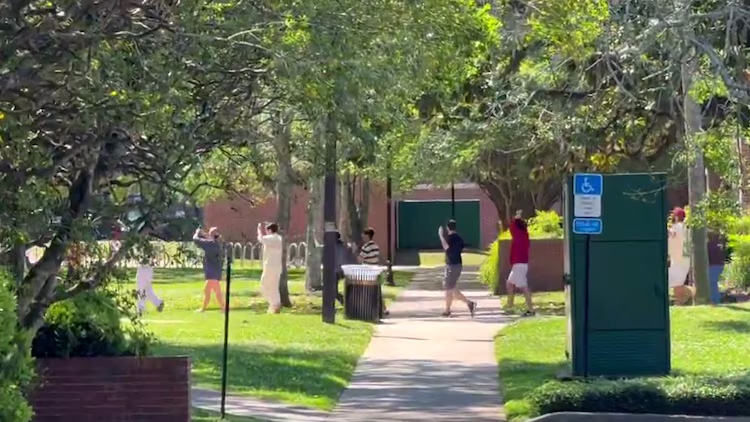Court temporarily blocks NC from requiring photo ID at polls in 2020
WINSTON-SALEM, N.C. -- A federal court in Winston-Salem has ordered to block the use of voter ID in the March primary elections in North Carolina.
The federal court announced that next week U.S. District Judge Loretta Biggs will formally block a photo ID requirement scheduled to begin in 2020. Unless the upcoming preliminary injunction is successfully appealed, the requirement will be halted until a lawsuit filed by the state NAACP and others is resolved.
Thursday's short written notice from the federal court in Winston-Salem previewed Biggs' order because state election officials were planning to expand efforts to educate voters about the ID law within days. Although the mandate would be carried out beginning with the March 3 primary, the requirement would actually start in just a few weeks with mail-in absentee ballot filers, who also would have to provide an ID copy.
The mandate identified several types of qualifying photo IDs and allowed people lacking one to get a free ID card or to fill out a form while voting explaining their "reasonable impediment" to obtaining one.
GOP leaders in charge of the legislature have been trying for most of the decade to advance voter ID, saying that more than 30 states require it and it builds confidence in elections. Data show voter impersonation is rare, however. The voting pool - currently 6.8 million registered voters - is critical in a closely divided presidential battleground state where statewide races are often competitive between the major parties.
Voter ID was actually carried out in North Carolina's 2016 primary elections as the result of a 2013 law. But a federal appeals court struck down several portions of the law in July 2016, saying photo ID and other voting restrictions were approved with intentional racial discrimination in mind.
Republicans strongly disagreed with that decision and put a constitutional amendment on the November 2018 ballot - a strategy designed to give the idea more legal and popular standing. The amendment passed with 55% of the vote. The legislature approved a separate law in December 2018 detailing how to implement that amendment. Lawsuits challenging that new law were filed immediately.
Lawyers for the state and local NAACP chapters told Biggs in a court brief that the latest version of voter ID is a "barely disguised duplicate" of the 2013 voter ID law and "carries the same discriminatory intent as its predecessor," likely violating the U.S. Constitution.
The new rules allow additional government IDs to meet the mandate, including public and private university cards. But they still prevent government IDs for public assistance programs from being used, disproportionately affecting African Americans, the NAACP said.
The actual reasons for Biggs issuing the injunction - and whether the legislature could pass a law altering the rules to resolve her concerns - won't be known until the formal order is released.
READ MORE: North Carolina will be a political hot spot as 2020 election nears
State NAACP President the Rev. Anthony Spearman praised Biggs' decision, calling the 2018 measure "the latest bad-faith attempt in a string of failed efforts by the (North Carolina) General Assembly to impede the right to vote of African Americans and Latinos in this state, and to blunt the force of the true will of the people."
Republican House Speaker Tim Moore of Cleveland County criticized the notice Friday as a "last-minute attempt by an activist federal judge to overturn the will of North Carolina voters." He said the ruling should be "immediately appealed" by the State Board of Elections, which is a defendant in the case. The board is composed of three Democrats and two Republicans, all appointed by Democratic Gov. Roy Cooper, who is a voter ID opponent.
"To issue an injunction against one of the nation's most lenient voter ID laws - which 34 states already have - without providing an opinion is an outrageous affront to due process, the rights of North Carolina voters, and the rule of law," Moore said.
The NCGOP called on the Attorney General to appeal the decision and "defend the voters of North Carolina."
Attorneys from the state Department of Justice represented the board in court to attempt to uphold the 2018 voter ID law. They argued that the mandate was improved to address previous concerns of bias and the plaintiffs failed to show it was enacted with discriminatory intent. Cooper vetoed the December 2018 law, but two Democratic legislators joined all Repubilcans voting to override the veto.
The department declined to comment Friday about a possible appeal as it awaits Biggs' full order, said Laura Brewer, a spokeswoman for Democratic Attorney General Josh Stein.
Two other lawsuits challenging the voter ID mandate or the constitutional amendment are pending in state courts.
Republican senators Warren Daniel and Joyce Krawiec released a joint statement on the court order.
"An overwhelming majority of North Carolina voters amended the state Constitution to require voter ID, and an unelected judge just suppressed their votes. The bill to implement that amendment was passed by a bipartisan supermajority and was even sponsored by a Democrat. It provides more ways to comply with the ID requirement than almost any state in the country, including issuing free IDs. We urge the Attorney General's office and the State Board of Elections to immediately appeal this decision, since this vote-suppressing judge won't even permit the legislature to participate in the case and defend the law from this latest radical attack."






